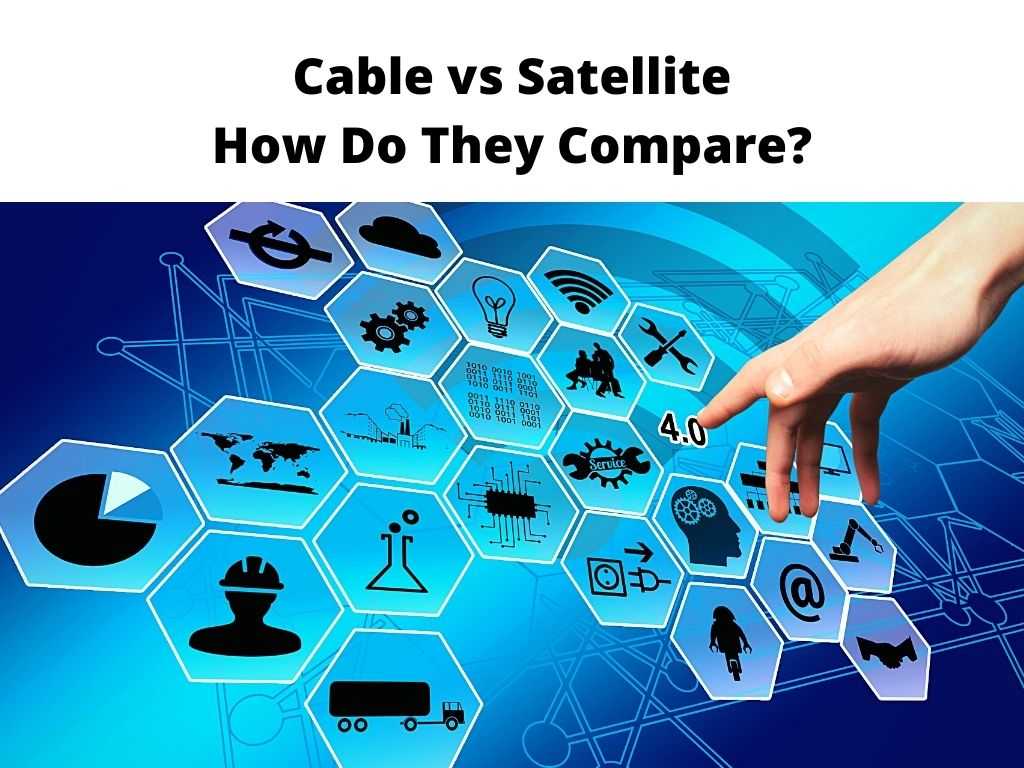When it comes to selecting a TV service, the decision isn’t always cut and dry. Two primary competitors in the market, cable and satellite television, both have their unique perks and drawbacks. To make an informed decision, it’s crucial to dissect and compare these services.

TL;DR: Cable TV is generally more reliable, particularly in adverse weather, but can be limited by geography and often has fewer channels than satellite TV. Satellite TV, on the other hand, offers more channels and broader coverage but is susceptible to disruptions due to weather.
Scroll down to get a detailed answer
Table of Contents
Breaking Down the Basics
Cable TV
Cable television is a system that provides television programs to consumers via radio frequency signals transmitted through coaxial cables or light pulses through fiber-optic cables. It’s a well-established method, with a presence in many homes across the globe.
Satellite TV
Satellite television, on the other hand, relies on a broadcast communication satellite in Earth’s orbit to deliver television programming. This technology enables viewers in locations too remote for cable to access television services.
Cable vs Satellite: A Comparative Analysis
| Cable TV | Satellite TV | |
|---|---|---|
| Reliability | High (less weather disruption) | Lower (subject to weather conditions) |
| Coverage | Limited (restricted to cable network area) | Wide (available anywhere with a clear view of the sky) |
| Channels | Fewer | More |
| Installation | Easy | More complex |
| Price | Varies, often cheaper | Can be higher |
Performance and Reliability
When it comes to reliability, cable often comes out on top. Cable TV is less likely to be affected by weather conditions, while satellite TV signals can be disrupted by storms and heavy cloud cover. On the other hand, satellite TV usually provides superior picture and sound quality compared to cable TV.
Coverage and Availability
Satellite TV generally offers broader coverage than cable TV. Cable services rely on physical infrastructure, which can be limiting for people living in rural or remote areas. Satellite services, on the other hand, only require a clear view of the southern sky, making them accessible almost everywhere.
Channel Variety and Content
Satellite TV often wins in the category of channel variety. With the capability to receive signals from multiple satellites, it typically offers more channels and programming options than cable TV.
Cost Considerations
Cost is a significant factor when deciding between cable and satellite TV. The price varies significantly based on the provider, package, and region. While cable packages can often be cheaper, satellite TV often includes more channels, potentially offering better value for money.
Here are all the providers with satellite and cable TV options
| Provider | Connection Type | Estimated Basic Cost (Monthly) | Notable Features | Extra Fees |
|---|---|---|---|---|
| Comcast (Xfinity) | Cable | $50 – $90 | DVR service, On-Demand, Multiple device streaming, Internet bundles | Equipment rentals, Installation |
| AT&T U-verse | Cable | $60 – $130 | DVR service, On-Demand, Internet & Phone bundles | Equipment rentals, Installation |
| Spectrum (Charter) | Cable | $45 – $95 | No contracts, On-Demand, Multiple device streaming | Equipment rentals, Installation |
| DISH Network | Satellite | $65 – $95 | DVR service, High-definition programming, Internet bundles | Equipment rentals, Installation, Early termination |
| DirecTV | Satellite | $65 – $130 | NFL Sunday Ticket, High-definition programming, On-Demand | Equipment rentals, Installation, Early termination |
| Verizon Fios | Fiber | $65 – $105 | No contracts, 4K Ultra High-Definition, On-Demand, Internet & Phone bundles | Equipment rentals, Installation |
| Cox Communications | Cable | $50 – $100 | DVR service, On-Demand, Internet bundles | Equipment rentals, Installation |
| Altice (Optimum and Suddenlink) | Cable | $50 – $105 | No contracts, On-Demand, Internet bundles | Equipment rentals, Installation |
| Mediacom | Cable | $50 – $100 | DVR service, On-Demand, Internet bundles | Equipment rentals, Installation |
| Frontier Communications | Fiber | $55 – $85 | No contracts, On-Demand, Internet & Phone bundles | Equipment rentals, Installation |
| HughesNet | Satellite | $65 – $150 | Primarily used for Internet, could be paired with satellite TV | Equipment rentals, Installation, Early termination |
Other Helpful Information
Considering customer service is essential when choosing between cable and satellite TV. Public opinion often leans towards satellite providers for better customer service, but this can vary between companies.
Moreover, consider the contract and terms of service. Some providers require a long-term contract, which can be a significant commitment. It’s worth investigating before making a decision.
Concluding Thoughts
The decision between cable and satellite TV depends on your specific needs and circumstances. If reliability and cost are your main concerns, cable might be the best option. If you prioritize channel variety and live in a remote area, satellite TV could be a better choice.
FAQ
Is cable better than satellite TV?
“Cable vs satellite” is not a matter of one being outright better than the other. Both have their pros and cons. Cable is generally more reliable and not affected by weather, while satellite offers a broader range of channels and wider coverage.
Are satellites faster than cables?
Not necessarily. While satellite TV offers more channels and wider coverage, the transmission time is not necessarily faster than cable TV. Any perceived speed differences are often negligible to the end viewer.
Are satellites more expensive than cables?
The cost of satellite and cable TV can vary significantly depending on the specific package and provider. While satellite TV often offers more channels, which can increase cost, there are budget-friendly options available for both services.
What is cable vs satellite vs IPTV?
Cable and satellite are traditional forms of television broadcasting, using coaxial cables or satellites in orbit to transmit signals. IPTV (Internet Protocol Television) is a newer form of broadcasting that streams television over the internet, which requires a stable and high-speed internet connection. Each has its own advantages and disadvantages.


